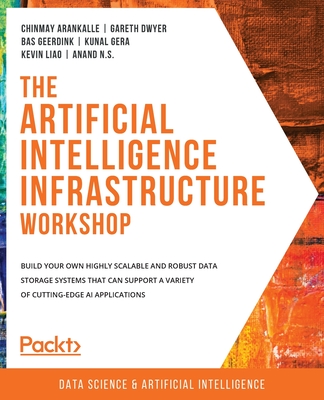Machine Learning Infrastructure and Best Practices for Software Engineers: Take your machine learning software from a prototype to a fully fledged sof
暫譯: 機器學習基礎設施與軟體工程師最佳實踐:將您的機器學習軟體從原型轉變為完整產品
Staron, Miroslaw
- 出版商: Packt Publishing
- 出版日期: 2024-01-31
- 售價: $1,690
- 貴賓價: 9.5 折 $1,606
- 語言: 英文
- 頁數: 346
- 裝訂: Quality Paper - also called trade paper
- ISBN: 1837634068
- ISBN-13: 9781837634064
-
相關分類:
Machine Learning
海外代購書籍(需單獨結帳)
相關主題
商品描述
Efficiently transform your initial designs into big systems by learning the foundations of infrastructure, algorithms, and ethical considerations for modern software products
Key Features:
- Learn how to scale-up your machine learning software to a professional level
- Secure the quality of your machine learning pipeline at runtime
- Apply your knowledge to natural languages, programming languages, and images
Book Description:
Although creating a machine learning pipeline or developing a working prototype of a software system from that pipeline is easy and straightforward nowadays, the journey toward a professional software system is still extensive. This book will help you get to grips with various best practices and recipes that will help software engineers transform prototype pipelines into complete software products.
The book begins by introducing the main concepts of professional software systems that leverage machine learning at their core. As you progress, you'll explore the differences between traditional, non-ML software, and machine learning software. The initial best practices will guide you in determining the type of software you need for your product. Subsequently, you will delve into algorithms, covering their selection, development, and testing before exploring the intricacies of the infrastructure for machine learning systems by defining best practices for identifying the right data source and ensuring its quality.
Towards the end, you'll address the most challenging aspect of large-scale machine learning systems - ethics. By exploring and defining best practices for assessing ethical risks and strategies for mitigation, you will conclude the book where it all began - large-scale machine learning software.
What You Will Learn:
- Identify what the machine learning software best suits your needs
- Work with scalable machine learning pipelines
- Scale up pipelines from prototypes to fully fledged software
- Choose suitable data sources and processing methods for your product
- Differentiate raw data from complex processing, noting their advantages
- Track and mitigate important ethical risks in machine learning software
- Work with testing and validation for machine learning systems
Who this book is for:
If you're a machine learning engineer, this book will help you design more robust software, and understand which scaling-up challenges you need to address and why. Software engineers will benefit from best practices that will make your products robust, reliable, and innovative. Decision makers will also find lots of useful information in this book, including guidance on what to look for in a well-designed machine learning software product.
商品描述(中文翻譯)
有效地將您的初步設計轉化為大型系統,學習基礎設施、演算法和現代軟體產品的倫理考量
主要特點:
- 學習如何將您的機器學習軟體擴展到專業水平
- 在執行時確保您的機器學習管道的質量
- 將您的知識應用於自然語言、程式語言和圖像
書籍描述:
雖然如今創建機器學習管道或從該管道開發工作原型的軟體系統變得簡單明瞭,但通往專業軟體系統的旅程仍然漫長。本書將幫助您掌握各種最佳實踐和配方,幫助軟體工程師將原型管道轉化為完整的軟體產品。
本書首先介紹利用機器學習作為核心的專業軟體系統的主要概念。隨著進展,您將探索傳統非機器學習軟體與機器學習軟體之間的差異。最初的最佳實踐將指導您確定產品所需的軟體類型。隨後,您將深入探討演算法,涵蓋其選擇、開發和測試,然後探索機器學習系統基礎設施的複雜性,定義識別正確數據來源和確保其質量的最佳實踐。
在結尾部分,您將處理大型機器學習系統中最具挑戰性的方面——倫理。通過探索和定義評估倫理風險和緩解策略的最佳實踐,您將在書籍的結尾回到一開始的主題——大型機器學習軟體。
您將學到的內容:
- 識別最適合您需求的機器學習軟體
- 使用可擴展的機器學習管道
- 將管道從原型擴展到完整的軟體
- 為您的產品選擇合適的數據來源和處理方法
- 區分原始數據與複雜處理,並注意其優勢
- 追蹤和緩解機器學習軟體中的重要倫理風險
- 進行機器學習系統的測試和驗證
本書適合誰:
如果您是機器學習工程師,本書將幫助您設計更穩健的軟體,並了解需要解決的擴展挑戰及其原因。軟體工程師將從最佳實踐中受益,使您的產品更加穩健、可靠和創新。決策者也會在本書中找到許多有用的信息,包括關於如何評估設計良好的機器學習軟體產品的指導。











